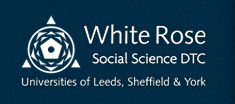Deadline extended for PhD scholarship
Posted on 18 March 2015

ESRC White Rose DTC Network Studentship
We welcome applications for a PhD studentship at the University of York. This studentship forms part of an ESRC White Rose DTC Network of three studentships focussing on “Understanding and enhancing reading and language skills in children learning English as an additional language.” Further details of the network can be found at the following link http://wrdtc.ac.uk/postgraduate-programme/white-rose-esrc-networks-2015/.
For details of the Leeds studentship please contact Dr Anna Weighall (a.r.weighall@leeds.ac.uk) and for details of the Sheffield studentship please contact Dr Silke Fricke (s.fricke@sheffield.ac.uk). Those interested in the Network are encouraged to apply for only one of the available studentships.
The Leeds studentship would be co-supervised by Dr Emma Marsden and co-supervised by another member of the Department of Education.
The Network Studentships are funded by the ESRC and supervised by the White Rose Doctoral Training Centre. Supervision will be coordinated across the White Rose Doctoral Training Centre involving the Universities of Leeds, Sheffield, and York. These closely aligned PhDs will help to develop the English as an Additional Language and Literacy network (EALL-N) started by the lead investigators in 2013. All the studentships start in the 2015/16 academic year for a period of three years.
York-Based Studentship
Reading Comprehension Skills in Children Learning English as an Additional Language
Principal Supervisor: Dr Claudine Bowyer-Crane, Dept of Education, University of York
Co-Supervisor: Dr Jenny Thompson, Dept of Human Communication Sciences, University of Sheffield.
Project Description
Whilst much is known about the development of skilled monolingual readers, this evidence base is lacking when it comes to children learning EAL. Indeed, there is surprisingly little work examining the different components that underpin reading comprehension in second language learners and the developmental trajectory of these skills through the primary school years, particularly in a UK educational context. Given the increasing diversity of languages represented in UK schools, this is clearly an area of growing importance. Moreover, children learning EAL typically show specific difficulties with reading comprehension (e.g. Burgoyne et al, 2009; Burgoyne et al, 2011a; Burgoyne et al, 2011b; Hutchinson et al, 2003; Bowyer-Crane & Thompson, 2012). Knowing more about the development of reading comprehension in diverse populations will help develop successful educational programmes that can address the achievement gap occurring between learners from different language heritages.
Our main aim is to develop a comprehensive profile of the skills underpinning reading
comprehension in both monolingual and EAL children. Using a sequential design to enable both cross-sectional and longitudinal data collection, the student will employ standardised and bespoke measures to explore the broader language and cognitive skills important to reading comprehension, e.g. vocabulary (e.g. Ricketts et al, 2007), listening comprehension (e.g. de Jong & Van der Liej, 2002), inference generation (e.g. Oakhill & Cain, 2012), narrative skills (Oakhill & Cain, 2012; Cragg & Nation, 2006), grammar (e.g. Muter et al, 2004), working memory (Nation et al, 1999) and executive function (i.e. suppression; De Beni & Palladino, 2000; Palladino et al, 2001; Cain, 2006). Such an evidence base will enable the design of targeted instruction which may enhance the literacy development of children from both monolingual and EAL backgrounds. It is proposed that the student will initially recruit a sample of EAL and monolingual English speaking children in years 2 and 4 of mainstream education, and will revisit these children in year 3 and year 5 to collect longitudinal data.
This network is in partnership with Born in Bradford. The successful candidate would need to travel regularly to participating primary schools for data collection purposes.
Award
A full standard studentship consists of academic fees together with a maintenance grant paid at standard Research Council rates. Generally, UK students will be eligible for a full award and other European Union applicants will be eligible for an award paying academic fees only, except in cases where residency in the UK has been established for more than 3 years prior to the start of the programme of study
Application Procedure
Applicants must hold at least a UK upper second class honours degree or equivalent and demonstrate that they have already completed the full research training requirements for a +3 award, usually through a masters level qualification.
Applicants must apply for a place on the PhD programme deadline using the university online application form (http://www.york.ac.uk/study/postgraduate/courses/search?level=postgraduate&q=education ).
They must also complete the University of York ESRC WR DTC Studentship Application Form, available at: https://www.york.ac.uk/media/study/documents/postgraduate/finance/socialsciences/ESRCAppFormYork2015.doc
ESRC WRDTC application forms must be submitted to Kay Mitchell (research-student-admin@york.ac.uk) and Claudine Bowyer-Crane (claudine.bowyer-crane@york.ac.uk).
The deadline for the receipt of both application forms is April 13th 2015.
If you have any queries please contact Claudine Bowyer-Crane directly on 01904 324398 or at the above email address.
